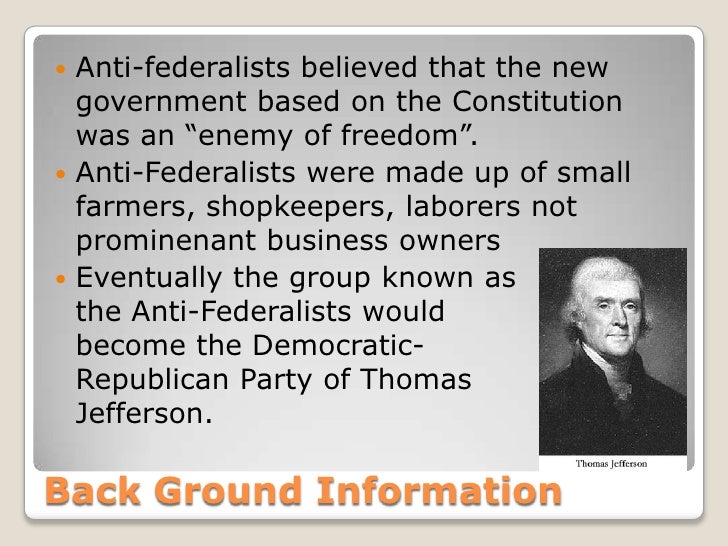
Thomas Jeffersons opposition to the Federalists 1810 The Federalist Party evolved from the core of Federalists like George Washington and Alexander Hamilton who wrote and defended the US Constitution in 17871788. The main Anti-Federalist was Thomas Jefferson.

However their ideas helped.
Was thomas jefferson a federalist or anti federalist. Thomas Jeffersons opposition to the Federalists 1810 The Federalist Party evolved from the core of Federalists like George Washington and Alexander Hamilton who wrote and defended the US Constitution in 17871788. The political party advocated a strong central government and supported a liberal construction of the Constitution. After losing the Election of 1800 to Thomas Jefferson the Federalists would never retake control of the oval office.
The Federalist Party was primarily focused on a strong centralized American government. They wanted to boost the economy and maintain a beneficial relationship with Great Britain. Knowing that the Federalists were mostly businessmen and bankers its pretty fitting that the party.
Jefferson Thomas Date 14 February 1802 Reference Cite as To Thomas Jefferson from A Federalist Democrat 14 February 1802 Founders Online National Archives httpsfoundersarchivesgovdocumentsJefferson01-36-02-0383. The Papers of Thomas Jefferson vol. 36 1 December 18013 March 1802 ed.
It was supposed to be held in Annapolis Maryland in September 1786. Only 12 delegates showed up from 5 states. NYNJPADEand VAMaryland did not send Representatives even though it was in their state.
It was then to reconvene in Philadelphia. This is because It was the geographical historical and social center of the US. With the passage of the Constitution and the Bill of Rights the Anti-Federalist movement was exhausted.
Some activists joined the Anti-Administration Party that James Madison and Thomas Jefferson were forming about 179091 to oppose the policies of Treasury Secretary Alexander Hamilton. This group soon became the Democratic-Republican Party. The Democratic-Republican Party gained national prominence through the election of Thomas Jefferson as president in 1801.
This election is considered a turning point in US. History because it led to the first era of party politics pitting the Federalist Party against the Democratic-Republican Party. Thomas Jeffersons December 20 1787 letter to James Madison contains objections to key parts of the new Federal Constitution.
Primarily Jefferson noted the absence of a bill of rights and the failure to provide for rotation in office or term limits particularly for the chief executive. Federalists VS Anti-Federalists by Reed Hardy 1. They were elegant organized city men and for the most part the greatest minds of all time.
They supported the Constitution. Hamilton Jay and Madison wrote a series of 85 essays that became known as The Federalist. The main Anti-Federalist was Thomas Jefferson.
Federalists were usually rich urban and intelligent. Anti-Federalists were usually poor farmers that were less intelligent. The Federalist won the battle of the Constitution and founded the government off their ideas.
The Anti-Federalists ideas were not used as much. However their ideas helped. The prospect of amendments mollified enough radicals to allow the Constitution to squeak through.
The aging Sam Adams was one such Anti Federalist finally voting for ratification at the Massachusetts convention. Jefferson then serving as the American minister in France urged ratification but only by the requisite nine states. The remaining states should he maintained hold back until.
Thomas Jefferson Federalist Essays in History 35 19-32 OSI file created. 28 Nov 1995 Postprint Commercial use prohibited. Usage governed by our Conditions of Use Connect to Essays in History Volume 35 We are all republicans–we are all federalists Thomas Jefferson told the American people in his first inaugural address.
A President above Parties who believed factionalism jeopardized the. The split between Federalists and Anti-Federalists continued even after North Carolina joined the Union. Many citizens distrusted the Federalists who strengthened the central government and began to persecute political dissenters.
At the suggestion of Thomas Jefferson the Anti-Federalists began calling themselves Republicans. Under this name they grew in strength until they won the presidential. Anti-Federalists such as Thomas Jefferson feared that a concentration of central authority might lead to a loss of individual and states rights.
They resented Federalist monetary policies which. James Madison to Thomas Jefferson Virginia Oct 24 1787. Monitor Essay Massachusetts Oct 24 1787.
Centinel II Pennsylvania Oct 25 1787. 1 New York Oct 25 1787. Cato III New York Oct 25 1787.
A Federalist Essay Pennsylvania Oct 27 1787. John DeWitt II Massachusetts Oct 27 1787. An Old Whig IV Pennsylvania.
Anti-Federalist George Mason taught Federalist Thomas Jefferson and Federalist James Madison a thing or two. George Mason of Virginia was a generation older than fellow Virginians Thomas Jefferson and James Madison. Mason started his political career in the Virginia House of Burgesses when Jefferson was still only 15 years old and James Madison was but the tender age of.
Jefferson sincerely believed that the principles of 76 were being betrayed by a Federalist version of the court party whose covert scheme was to install monarchy and a pseudo-aristocracy of bankers and monocrats to rule over the American yeomanry. Decide if the individuals described below were a Federalist an Anti-Federalist or undecided. Beneath each biography list the reasons for your selection.
_____ Thomas Abraham Clark the son of a prominent Philadelphia lawyer was born into extreme wealth. He was educated at home by private tutors and entered local politics at a very early age. He soon rose to the top of his state in politics.